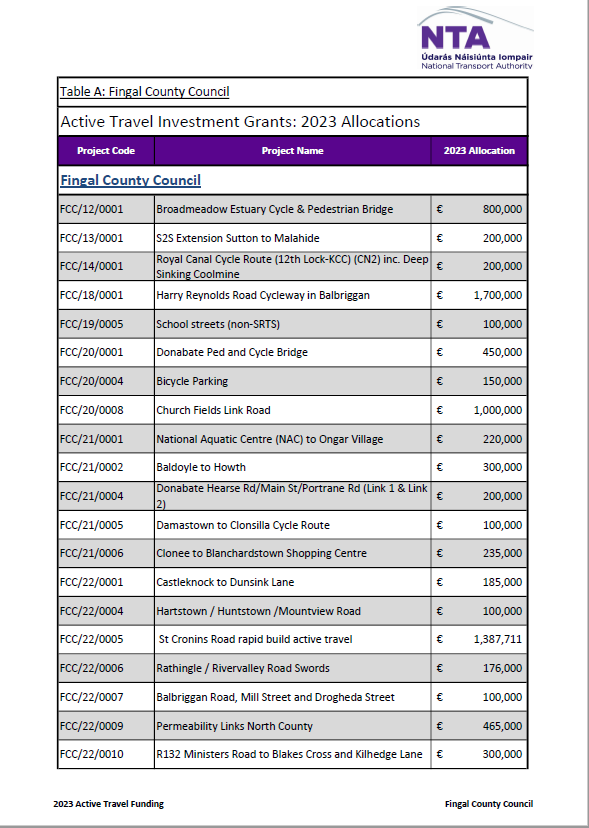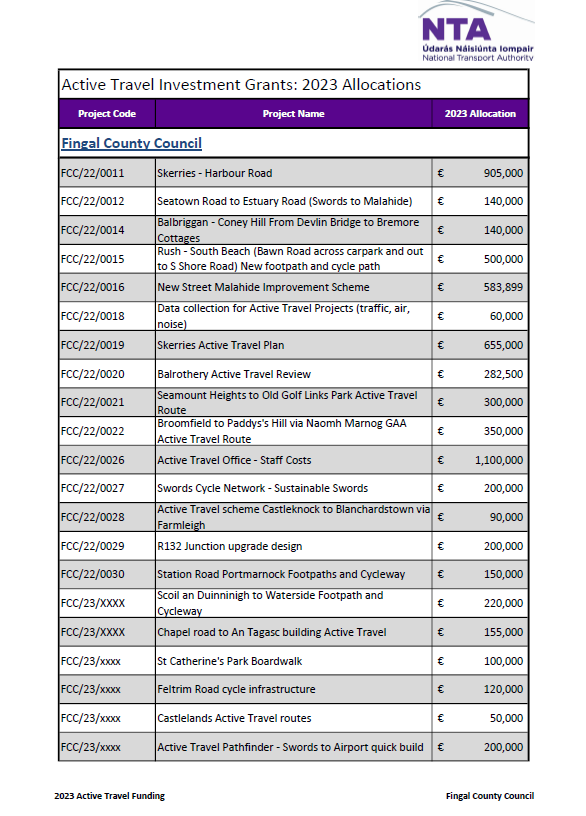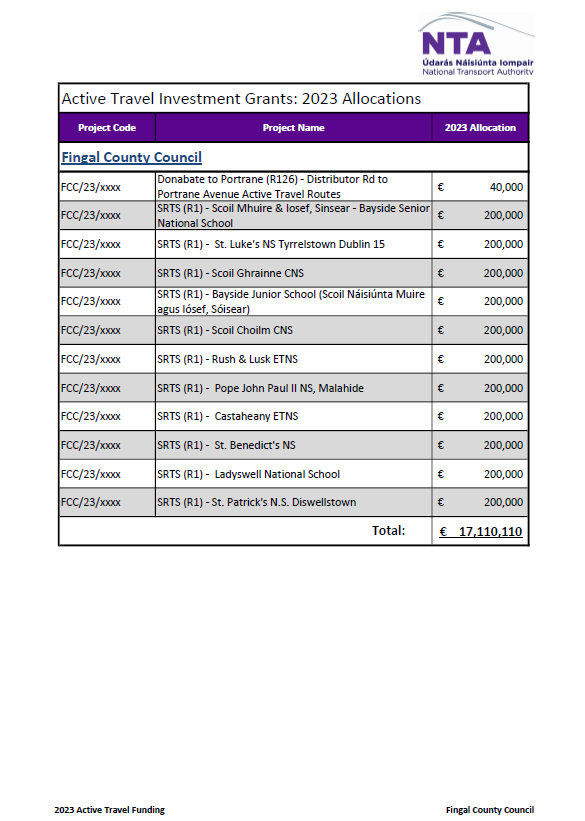|
The Minister for Housing, Local Government and Heritage, Darragh O’Brien, has reminded people that major improvements to the Local Authority Home Loan, which sees more people being able to apply for the State-backed mortgage, have taken effect, from today (1 March 2023).
Prices of homes eligible for a Local Authority Home Loan have been increased nationwide as have the income limits of those eligible to apply for a loan. Commenting, Minister O’Brien said: “From today the improvements to the Local Authority Home Loan take effect meaning more people, across all our Local Authorities, will be eligible for a State backed mortgage. Supporting home ownership is a key objective for this government and the increase in house price limits, coupled with the increase in income limits, will result in more people buying their own home. “Importantly, building on improvements made this time last year, we have again increased the income limit for single applicants so that those earning up to €70,000 can now avail of the State-backed mortgage. “These changes reflect the reality of today’s housing market. We will continue to keep the Local Authority Home Loan under review to ensure it remains a vital and relevant support for people who want to own their own home.” Since February 2018 over 3,300 people have got on the property ladder through the Local Authority Home Loan and its predecessor the Rebuilding Ireland Home Loan. Minister O’Brien, along with Public Expenditure and Reform Minister Pascal Donohoe, have signed the amendment regulations to effect the changes below from today (1 March 2023). The following changes have taken effect: Increases to house price limits for all local authorities areas:
The Minister for Housing, Local Government and Heritage, Darragh O’Brien, today published figures that showed that one-fifth of notifications received by local authorities in the last year to convert certain vacant commercial premises into homes related to former pubs. One year ago, Minister O’Brien extended and amended existing regulations exempting certain types of vacant commercial premises from planning permission - where it is intended to provide residential units - to include former pubs. The regulations aim to promote the re-use of vacant commercial buildings for much-needed housing supply and to renew urban areas. The extension of the regulations to include pubs was intended to increase housing supply through this vehicle. The regulations, a part of the government’s Housing For All plan and Town Centre First Policy, are in place to the end of 2025. In 2022, local authorities received notifications of 260 exempted developments of this type. Fifty-three of these (with the intention to provide a total of 169 homes) related to pubs. Overall, of the 260 notifications received, plans put forward were aimed at providing 665 homes. Today’s figures also show that since 2018, when the exemptions were first introduced, local authorities have received notifications relating to the provision of 2,066 homes. Commenting on the one-year anniversary of signing the new regulations, Minister O’Brien said: “These figures show that government regulations to allow former, vacant pubs be converted into homes without needing planning permission is helping to tackle the problem of vacancy. In just ten months, the owners of 53 former pubs have notified local authorities of their intention to use this exemption. In recent years towns and villages have regrettably seen pubs close their doors for the last time but these exemptions are helping to provide housing, including ‘over the shop’ living in once-vacant spaces. These conversions are also helping to revitalise our town centres, something the government is committed to achieving through our ‘Town Centre First’ policy.’" The figures have been published as the department prepares to launch today (Monday 27 February) the second phase of its national ad campaign to raise awareness of the government’s vacant property supports. The campaign’s second phase highlights these planning permission exemptions and the Repair and Leasing Scheme. Commenting on the campaign, the Minister of State for Planning and Local Government, Kieran O’Donnell, said: “Right across the country the public are responding to the supports available for turning vacant property into homes. Over the next two weeks, we’re going to highlight both the planning permission exemptions for converting vacant commercial property into a home and the Repair and Leasing Scheme. The Repair and Leasing Scheme offers vacant property owners the opportunity to restore a property with the help of a local authority loan in return for guaranteed rent for a defined period of time by renting the property out for social housing. We urge anyone interested in buying, selling or leasing a vacant property that could be a home to visit gov.ie/vacancy or contact their local authority’s Vacant Homes Officer.” An Coimisiún Toghcháin (The Electoral Commission) is formally established on a statutory footing9/2/2023
Minister for Housing, Local Government and Heritage Darragh O’Brien and Minister of State for Heritage and Electoral Reform Malcolm Noonan have welcomed the formal establishment of An Coimisiún Toghcháin (the Electoral Commission) on a statutory footing today (9 February), paving the way for the Commission to begin its work as an independent body.
Both Ministers have also welcomed the appointment of the Hon. Ms. Justice Marie Baker to the role of An Coimisiún Toghcháin’s Chairperson. Her appointment to the role of Chairperson completes An Coimisiún’s seven-person membership, following the appointment of four ordinary members in December 2022. The Clerk of the Dáil and the Ombudsman will sit as ex officio members of An Coimisiún. Minister O’Brien said: “I wish to congratulate Justice Baker on her appointment as Chairperson of An Coimisiún Toghcháin. She will bring a wealth of experience and expertise to this significant role in the operation and safeguarding of our democratic processes. "I urge the public to engage with the important, upcoming work of the Commission in protecting and modernising our electoral landscape.” An Coimisiún Toghcháin is independent of Government, reporting directly to the Oireachtas and will be central to the administration, development and protection of our democratic processes and institutions. The establishment of An Coimisiún Toghcháin is a commitment in the Programme for Government: Our Shared Future and follows from the Electoral Reform Act 2022. An Coimisiún Toghcháin will carry out a broad range of core existing electoral functions, including explaining to the public the subject matter of referendums; reviewing Dáil Éireann and European Parliament constituencies and local electoral area boundaries and the preparation and maintenance of the Register of Political Parties. It will also carry out a number of new functions including research on electoral policy, the regulation of online political advertising and protecting the integrity of elections. Minister Noonan said: “An Coimisiún Toghcháin will be at the international cutting edge of electoral reform, particularly with respect to its significant powers and responsibilities in protecting our electoral system and processes in the online space – an area of growing concern. I’m particularly pleased that it will also have a role in researching the barriers to participation experienced by marginalised and disenfranchised groups, and in communicating impartial, reliable information to everyone, including hard to reach groups. The establishment of the Commission marks a milestone in the reform and modernisation of our electoral system. Ireland is known for the high democratic standard of its electoral processes and today’s announcement ensures that this will remain the case into the future.” NotesFunctions of An Coimisiún ToghcháinAn Coimisiún Toghcháin is independent of Government, reporting directly to the Oireachtas and will be central to the administration, development and protection of our democratic processes and institutions. It will take on a broad range of core existing electoral functions, including: (a) explaining to the public the subject matter of referendums; (b) reviewing Dáil Éireann and European Parliament constituencies and local electoral area boundaries; (c) the preparation and maintenance of the Register of Political Parties It will carry out a range of new electoral roles, including: (a) conducting research on electoral policy and procedure and making; recommendations to the Minister, thereby influencing the evolution of our electoral system; (b) providing the public with information on electoral processes (including referenda) and encouraging participation in the electoral and democratic processes of the State; (c) overseeing the management of the electoral register; (d) reporting on how electoral events are administered; (e) regulating online political advertising; and (f) protecting the integrity of elections and referendums against online disinformation, misinformation and manipulative or inauthentic behaviour The Minister for Housing, Local Government and Heritage, Darragh O’Brien, today published figures showing 2,307 vacant social homes were brought back into active use in 2022 under the Voids Programme. This is just above the anticipated figure of 2,273 vacant social homes, indicating that the intensive work in 2020 and 2021 by local authorities in this area has reduced the number of vacant social homes. The Voids Programme support local authorities in preparing vacant homes for re-letting.
Making more efficient use of existing housing stock is a key action in the government’s Housing for All plan. The Voids Programme builds on the ongoing work to tackle vacancy and dereliction and bring vacant properties into re-use for housing. Minister O’Brien said: “Apart from the obvious advantages of meeting demand for social housing, the return of these vacant social homes has a positive impact on communities. It helps avoid vacant homes becoming run down and derelict in some instances and the source of anti-social behaviour. “Local authorities seized the opportunity to bring these homes back into active use in 2022 and this will make a real difference to the lives of over 2,300 households. “It’s important to note and welcome the fact that nationally the number of vacant social homes requiring pre-letting works was lower in 2022 than in 2021 or 2020. This clearly shows that our plan is working. "In 2020 and 2021 we spent more than €88 million bringing 6,032 vacant social homes back into use, and evidently, we are reducing the number of voids in need of refurbishment works following those two intense years of tackling vacancy. “We are now progressively shifting to a position of planned maintenance of social housing stock to ensure minimal turnaround and re-let times for social housing stock.” In 2022, local authorities recouped almost €29 million in funding for stock improvement programmes for the refurbishment of vacant local authority-owned social housing. Of the €28.9 million, €3.6 million supported the transition to planned maintenance and included funding towards stock condition surveys. The number of vacant social homes that had works done to prepare them for pre-letting was lower in 2022 than in 2021 and 2020. This is a result of the intense two-year period of tackling long-term social housing vacancy and legacy vacancy. It was always envisaged that the programme would revert to more normalised levels in 2022. Local authorities are continuing to transition from a response-based approach to a strategic and informed planned maintenance approach to social housing. This is based on stock condition surveys. The planned maintenance/voids programme in 2022 supported this.
The Local Authority Home Loan was launched in January 2022 as part of Housing for All. It supports creditworthy borrowers who are unable to get finance from commercial banks to buy a home. It can be used for new, second hand or self-build homes. It means those on more moderate incomes are helped by the State to achieve homeownership, a key aim for this Government. The following changes to the Local Authority Home Loan will come into effect on 01 March 2023: Increases to house price limits for all local authorities areas
“I am delighted to announce these improvements to the Local Authority Home Loan which will take effect from March 1st. Supporting home ownership is a key objective for this Government and the increase in eligible house prices coupled with the increase in income limits will mean more people can access the loan. "Importantly, building on changes made this time last year we are again increasing the income limit for single applicants so that those earning up to €70,000 who wish to purchase a home can avail of the State backed loan. The ‘Fresh Start Principle’ also applies whereby people who are divorced or separated and have no interest in the family home, or who have undergone insolvency proceedings, can also avail of the loan. "The changes reflect the reality of today’s housing market and we will continue to keep the Local Authority Home Loan under review to ensure it remains a genuine and relevant support for people who want to own their own home.” Since February 2018 over 3,300 people have got on the property ladder through the Local Authority Home Loan and its predecessor the Rebuilding Ireland Home Loan. Minister O’Brien, along with Public Expenditure and Reform Minister Pascal Donohoe TD, will sign the amendment regulations in the coming weeks. The changes will take effect on 01 March 2023. Further info A Local Authority Home Loan offers two fixed interest rate products:
The maximum amounts that can be borrowed will be as follows:
https://www.gov.ie/en/collection/42d2f-local-authority-loan-activity/ More than €17M for Fingal County Council under Active Travel Investment Grants. Improved walking & cycling infrastructure including cycling lanes, pedestrian routes and wider footpaths for North County Dublin.
|
NEWSArchives
November 2023
|



